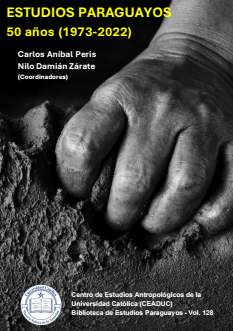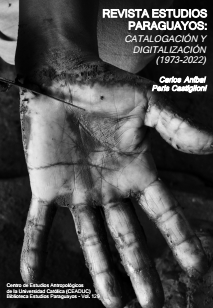30 years building the regime paraguayan informal security
DOI:
https://doi.org/10.47133/respy3390102Keywords:
social protection, social Security, clientelism, social politics, Welfare StatesAbstract
In 2019, Paraguay celebrated 30 years of democratic transition and, although progress is recognized in various aspects, there are still many shortcomings of the State and doubts about the ability to guarantee, for all its citizens, through goods, services and regulations as is established in the Constitutional Law (art. 6th). This article aims to contribute to the area of social policies in Paraguay, first conceptualizing the States / Welfare Regimes and the Paraguayan State as a unit of analysis where its historical characteristics, the Society-Market and State relations and the strong link with political patronage in its formation and expansion from the middle of the 20th century to the present day. In a second block, we review how these concepts developed are materialized through social policies, their characteristics, main strategies, programs and emblematic projects implemented and the evolution of the institutionality throughout three stages or phases that are well differentiated from each other: a ) the period corresponding to the years 1989 to 2002 characterized by being the initial or incipient phase of state intervention in social matters; b) second stage from 2003 to 2013, start of programs to fight against poverty, as well as the consolidation of some universal programs & politics and the expansion of the main constitutional social rights; and c) the period corresponding to the years 2013 to 2018, where there is a rupture and reconfiguration (both conceptually and programmatic- institutionally) of state management in terms of social policies.
Downloads
References
Abente, D. y Masi, F. 2005. Estado Economía y Sociedad: Una Mirada Internacional a La Democracia Paraguaya. CADEP
Abente D. 2012. Estatalidad y calidad de la democracia en Paraguay. AméRica Latina Hoy, 60, 43-66. doi:10.14201/alh.8973
__________. 2007. The quality of democracy in small south American countries: The case of Paraguay. Working Paper of the Helen Kellogg Institute for International Studies.
Banco Mundial. 2018. Paraguay. Invertir en capital humano: una revisión del gasto público y la gestión en los sectores sociales. © World Bank.
Bareiro, L. 2003. Tres Nicanores distintos y un solo presidente del Paraguay ¿Cuál será el verdadero?. En Nicanor Presidente 2003-2008 - ¿Un "Tendota" para el Paraguay?. Revista NOVAPOLIS Edición Número 4, agosto 2003
Borda, D. 2007. Paraguay: resultados de las reformas 2003-2005 y sus perspectivas. Comisión Económica para América Latina y el Caribe. Santiago.
Dirección General de Encuestas Estadísticas y Censos. 2018. Principales indicadores de pobreza de la población por año de la encuesta, según área de residencia. Período 1997/98. Recopilado de: https://www.dgeec.gov.py/assets/documento/61305Pobreza_py_EPH%201997-98_2018.xls
Duarte-Recalde, L. 2014. Concentración del poder político y debilitamiento estatal durante el gobierno cartista. En Revista Novapolis. No 7, Abr-Oct 2014, pp. 37-52. Asunción: Arandurã Editorial
____________________. 2018. La institucionalidad de la política de asistencia social en Paraguay en La Asistencia Social en Argentina y América Latina. Avances, problemas y desafíos. Andrenacci, Luis ; Campana, Mario; Servio, Matias. (eds) - 1a ed. - Rosario: Pegues.
Galeano, L. 2005. “El combate a la pobreza en Paraguay”, In Rivarola, D. (ed.), Política Social en la transición, Asunción, CPES. Ediciones y Arte Libros.
Nickson, A. y Lambert, P. 2002. 'State Reform and the Privatized State' in Paraguay', Public administration and development.
Esping-Andersen, G. 1990. The Three Worlds of Welfare Capitalism. Cambridge: Polity Press.
Gough, I. y Wood, G. S/F. Insecurity and Welfare Regimes in Asia, Africa and Latin America: Social Policy in Development Contexts, Cambridge: Cambridge University Press
Hopkin, J. 2006. Clientelism and party politics. En Crotty & Katz, Handbook of Party Politics (págs. 406-412). London: SAGE
Lachi, M. 2015. Pertenencia partidaria en Paraguay. Un estudio de caso sobre el electorado del departamento de Ñeembucú, y su comportamiento en las elecciones de 2013. Novapolis, 117-137.
Lachi, M. y Rojas Scheffer, R. 2018. Correligionarios, Actitudes y prácticas políticas del electorado paraguayo - 1a edición - Asunción: Centro de Estudios y Educación Popular Germinal y Arandurã Editorial.
Morínigo, J.N. 2005. La práctica del Orekueté como matriz de la discriminación política. En Bareiro, L., (ed) Discriminaciones. Debate teórico paraguayo. Legislación antidiscriminatoria. Asunción:CDE
Morley, S. y Vos, R. 1997. Poverty and Dualistic Growth in Paraguay. The Hague: Institute of Social Studies.
Organización para la Cooperación y el Desarrollo Económicos. 2018. Estudios de la OCDE sobre Gobernanza Pública: Paraguay: Hacia un desarrollo nacional mediante una gobernanza pública integrada, Éditions OCDE, Paris. Accesible en https://doi.org/10.1787/9789264304017-es
Ortiz, L.; González, I. y Gómez, C. 2015. Sistema político y desigualdad social en Paraguay. en torno al proceso gubernamental de 2008-2012 en Francisco J. Cantamutto [et al.] De la democracia liberal a la soberanía popular. Gobiernos latinoamericanos: los desafíos del Estado, la acumulación y la seguridad Ciudad Autónoma de Buenos Aires : CLACSO, 2015.
Rivarola, M. 2018. Políticas fiscales y desigualdad en Paraguay en Rivarola, M. (ed), Programa Paraguayo Para el Desarrollo de la y Tecnologia, CONACYT, Campaña por la Expresión Ciudadana, CADEP. Fiscalidad Para La Equidad Social. (Primera edición) Asunción, Paraguay: Decidamos, Campaña por la Expresión Ciudadana.
Rojas, J. 2017. Coordination and implementation of anti-poverty strategies: the case of Paraguay. Social Policy for Development (SPD).
_______. 2018a. El sistema clientelar paraguayo y su influencia en el Régimen de Inseguridad Social. Terere Cómplice Blog de Análisis Político. Disponible en https://tererecomplice.com/2018/09/19/el-sistema-clientelar-paraguayo-y-su-influencia-en-el-regimen-de-inseguridad-social/
_______. 2018b. Desafíos político-institucionales del sistema de protección social - Vamos!. En Revista Paraguay desde las Ciencias Sociales, revista del Grupo de Estudios Sociales sobre Paraguay, no 9, 2018, pp. 66-86 Instituto de Estudios de América Latina y el Caribe, Universidad de Buenos Aires. Argentina
Rojas Viñales, A. 2018. Determinantes estructurales de la política social del Estado Paraguayo “Tekoporã y la Pensión Alimentaria a Adultos Mayores”. Universidad Autónoma de Zacatecas.
Sampó, C. 2007. Las Falencias del Estado paraguayo desde la apertura democrática. Revista Enfoque Social. Revista de Historia, Política y Sociedad. Universidad de Tamaulipas, México.
Serafini, V. y Zavattiero, C. 2018. La Protección Social En El Paraguay; Avances y Desafí¬os Para La Garantí¬a De Derecho, Revista MERCOSUR de políticas sociales 2: 173.
Uribe Gómez, M. 2018. Ciclos políticos y política social en América Latina en el Siglo XXI. Forum Revista Departamento de Ciencia Política. (13): 101-118.
Wood, G. 2004. “Informal security regimes: the strength of relationships”. In Gough, Ian. and Wood, George. (eds) Insecurity and Welfare Regimes in Asia, Africa and Latin America: Social Policy in Development Contexts, Cambridge: Cambridge University Press.
Downloads
Published
How to Cite
Issue
Section
License
Copyright (c) 2021 José Antonio Rojas Caballero; Ana Teresa Rojas Viñales; Estudios Paraguayos

This work is licensed under a Creative Commons Attribution-NonCommercial 4.0 International License.
















